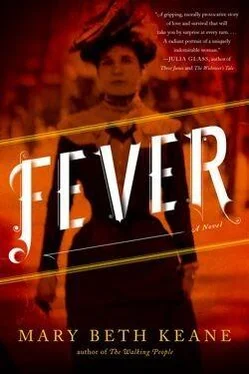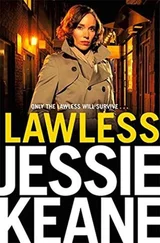In the days leading up to the hearing, she kept telling herself there were three possibilities: Alfred would be off the wagon, too drunk to keep track of dates and time and would not come, or Alfred would sober up and get himself there. The third possibility was the worst, and it wasn’t until that moment, staring at her reflection in the lavatory mirror, that she faced it head-on: he might not want to see her. Perhaps, in twenty-seven months, he’d worked up the courage to speak to that bright thing who made up the beds at the hotel on Thirty-Fourth Street and who sometimes waited outside Nation’s Pub for her brother. “She reminds me a bit of you, at that age,” he’d told Mary once, a passing comment, an answer to her question of how his day had been. She liked when he painted a full picture of his day for her and instead of drawing himself slumped on a stool, his head filled with goose-down feathers until halfway into that first tumbler, he told her about the world outside on the street, the call of the chestnut man, the rough comments about President Roosevelt’s oldest daughter, the man dressed in a suit of newspaper.
“Ma’am?” a woman’s voice called from the other side of the door. “The man says you’re to hurry.”
Mary swung the door open. It was the woman from the ticket window; her fingertips were black with ink, her forehead smudged where she’d rubbed it. “What man?” Mary asked loud enough for her guard to hear. “That?” She laughed. How easy it would be to get away, to leap onto the streetcar and disappear, or even to pick up her skirt and run. There was no running from North Brother, but here in the city she could simply turn a corner, and another, board a trolley, and be gone. John Cane had delivered two five-dollar bills with her breakfast that morning, money sent from Mr. O’Neill for anything unexpected she might encounter on her way down to the courthouse, and Mary had folded them tightly and slipped them inside her shoe. She observed her guard. The boy was so afraid of her it might be enough to just go near him. Just by walking toward him she could back him up into the river.
• • •
The plan was that Mr. O’Neill would get his medical men to answer their medical men and after the hearing, if the judge agreed that she shouldn’t have been taken bodily from her place of employment without a chance to defend herself, then she’d be going home to Alfred that evening. Unless Alfred had offered her side of the bed to someone else.
When they finally arrived at the courthouse, Mary searched for Alfred as she followed Mr. O’Neill down the marble-floored hallway. He’d stay in the shadows, she knew, until the last moment. It was possible she’d passed him as she rushed up the steps outside. Mr. O’Neill led her to a small private room just down the hall from the courtroom, where they had a few moments of peace before they went in to present their case. When he told her it was time, she removed the two squares of paper from her collar. Mr. O’Neill had been doing a sidelong inspection of her appearance since greeting her, and now that they were alone he gave her a quick look up and down.
“Well?” she asked after a moment.
“Well nothing,” he said. “Good.”
Mr. O’Neill warned her that the other lawyers would have rounded up as many of her old employers as they could, other house staff she’d worked with, anyone who might tell a story about her that would keep her on North Brother. Her most recent employers, Mr. and Mrs. Bowen, were unlikely to be in attendance. They would not want their name further tarnished by association, and besides, their daughter had died, it was a fact, and there was nothing they could say that would weigh more than that.
One of the last times she’d conversed with Mrs. Bowen, before Soper came looking for her, before the girl got sick, Mary had been wearing her new hat. Remembering that hat nagged her, and after more than two years of circling ’round and ’round why and how she’d gone from working and living in New York City, making a good wage, buying what she liked, to being trapped on an island, her thoughts kept returning to that hat. Where was it now? From the moment she was forced into the police wagon and taken to Willard Parker, she felt like she’d been flipping through a book to find a single sentence, running her finger along a page to find a single word, but when her mind lighted on that hat, she stopped. Her stomach sank. Sometimes one thing leads to another even if the line isn’t direct.
Some of the doctors had intimated that she was not right in her mind, that her mental state was part of the reason she could not be trusted, along with her being a woman, and being an immigrant, and being the kind of woman who lived with a man without being married. But she knew the hat had something to do with her capture in 1907, and she knew it now that her case was finally being examined, twenty-seven months later.
It was a lovely hat, cobalt blue with silk flowers and berries cascading around the brim, piled higher on one side of the crown than the other. It wasn’t one of those frothy confections meant to appear suspended over the head by magic, one of those ridiculous dollops of cream that required a morning’s worth of framing and supporting the hair that it sat upon. It was an everyday hat. A walking hat. The kind of hat where a woman could twist her hair as usual and then just place it on top, a pin here, a pin there, nothing more. The flowers weren’t simply cut out from the fabric, but labored over, each one a tiny piece of craftsmanship Mary examined in the shop before pushing her money across the counter. The shop was called Matilda’s, and she’d passed it dozens of times before the day she finally went inside. Nothing in the window had ever cried out to her until that hat, so she went in. She was extending her fingers to feel the brim when at the very same moment she remembered that her hands smelled of onions, and the shop’s mistress asked if she could be of any assistance. Mary wasn’t used to shops being so quiet, the mistress being so solicitous. She could feel the woman’s eyes on her from the moment she put her hand on the door’s handle. That first day, Mary said, “I’m in a terrible rush. I’ll have to return another time.” She let a few days go by, and then she scrubbed her hands well, rubbed her fingertips with lemon, and tried again. This time she picked the hat from its peg and held it to the light.
“It’s new,” the shop’s mistress said. “It was made in Paris.”
Mary asked how much and kept her face very still for the answer. It was an astonishing number, but she had it. She had the whole price of that hat in an envelope hidden in the frame of her bed at the Bowen residence. She was going to do it. As she walked away from the store she knew she was going to do it. Why not? She had no one to answer to but herself, and what was money for if not to be spent on a beautiful hat? On her next visit, Mary told the woman that if she discovered the craftsmanship to be less than it appeared, she would take the hat straight back and demand her money returned. The woman suggested a plain gray toque with a narrow brim and showed Mary the neat stitching as if to tell her that gray and plain might be more appropriate to a head like Mary’s than a cobalt jewel that would draw every glance. Mary ran her thumb along one of the silk petals and bought it on the spot.
When she returned to her room at the Bowen residence, she studied it in the box for the better part of an hour, those flowers, each one centered with a small piece of glass that drew the light, the blue of the petals slightly paler than the rest of the hat, the blue of the berries slightly darker. It was a beautiful thing and she loved it. It lived in its box on top of her dresser for two whole weeks before she put it on her head and wore it outside. She paired it with the chestnut dress coat she’d purchased secondhand, and she worried for it when she stepped into the weather and found the day not as fair as it had seemed from her room. She didn’t want it to get wet, or be stolen from her head by a thief. Or worse, it occurred to her as she remembered the week before, when a gentleman’s handkerchief was carried away in the wind. Mary had joined the chase for a few steps, until she predicted where it was headed, and when he caught up with it, he found it had landed on the belly of a horse that had died in the street and been left there to rot and draw flies. Mary had laughed when, out of habit, the gentleman reached for his hanky, to cover his face, but of course it was the hanky he’d been chasing in the first place.
Читать дальше












